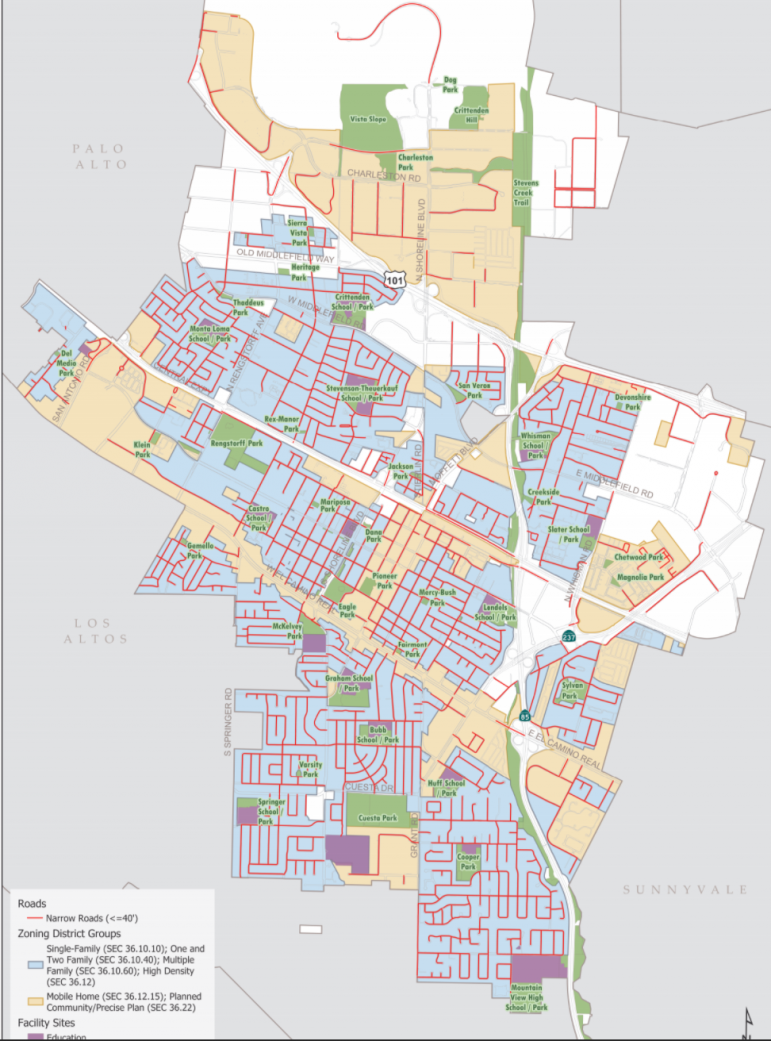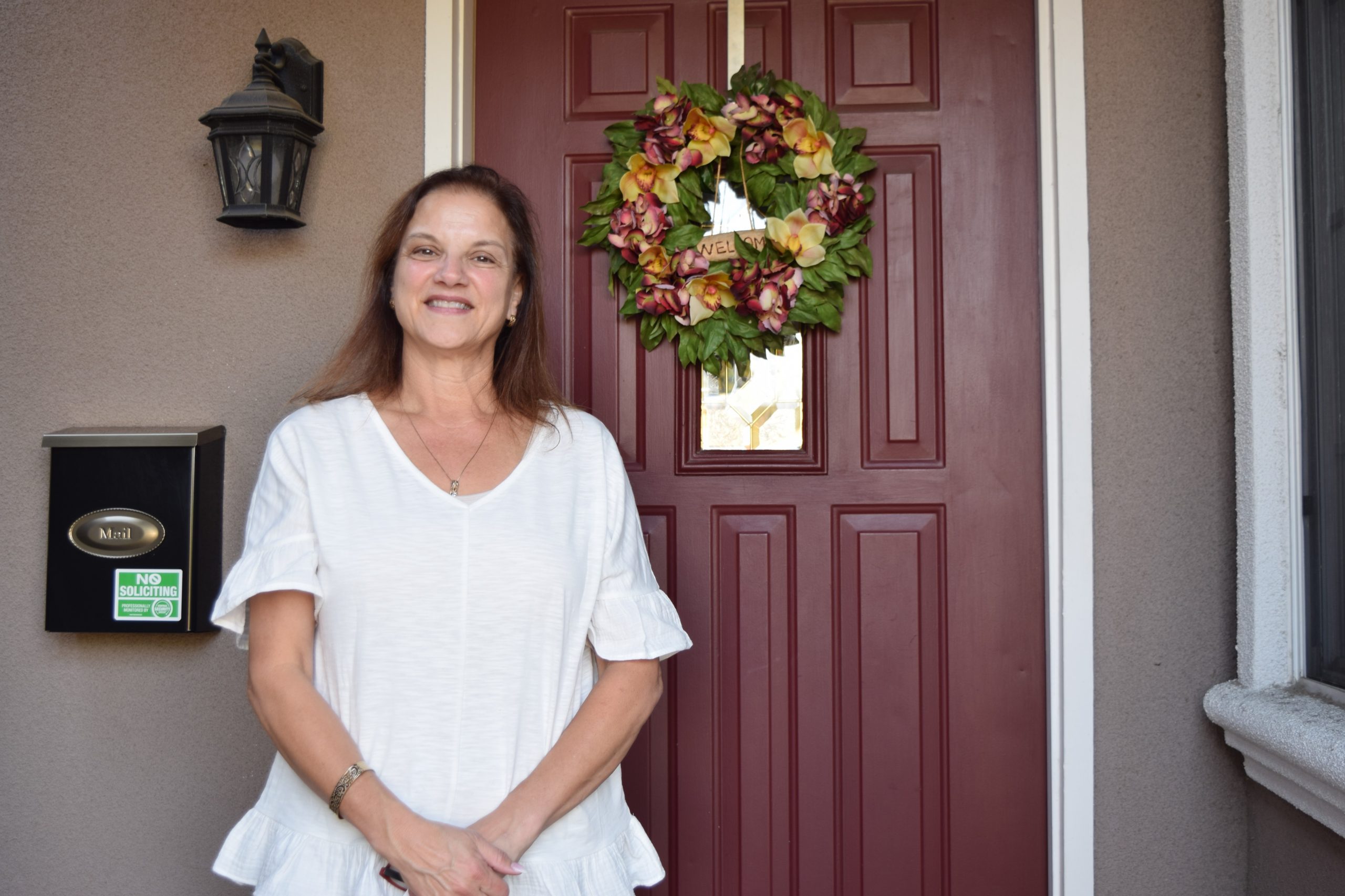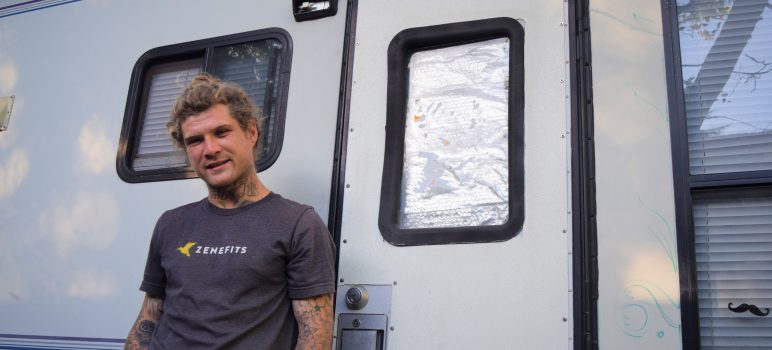Near an empty apartment complex in Mountain View, set to be demolished to make way for million-dollar homes, Dustin Fehrmann looked on from outside his RV, where he lives. “I really can’t afford to live in a house here, or commute back and forth from where I could be living,” he said.
Measure C, a 2020 ballot measure, could reduce his options for where he settles in for the night, however. The measure would enact Mountain View's controversial Narrow Streets Ordinanc, and would ban RVs like Fehrmann's from parking along the majority—or 78 percent—of the city’s streets.
Commonly referred to as the “RV ban,” the measure was narrowly approved by Mountain View City Council in September 2019. The ordinance was halted when housing activists gathered more than 4,000 signatures and submitted a petition to the Santa Clara County Registrar of Voters in November. From there, the city had two choices: remove the ordinance, or put it on a ballot for voters to decide. Council members voted in January to put the ordinance on this year’s general election ballot.
Fehrmann said he needs a place to park where it is safe and close to where his son and son’s mother live. “This is a great place for kids to grow up,” he said. “I know that I can go into work and won’t come home to a burglary.”
But when Fehrmann does find occasional work, he comes back home to tow notices stuck to his window. “What that does to my anxiety and my mental health, it’s not fair,” he said. “I don’t do drugs, don’t drink or any of that. I’m just trying to work and survive.”
Mountain View Mayor Margaret Abe-Koga, who supports Measure C, said she and other residents are not without compassion for people in Fehrmann’s situation.
The city now has more than 100 spots in its safe parking lots, many of which accommodate oversized vehicles such as RVs, Abe-Koga said. Residents in the lots also get assistance with transitional services from Community Services Agency, a social work nonprofit serving Los Altos and Mountain View.
“We have the largest program in the county, even bigger than San Jose’s,” Abe-Koga said, noting that San Jose’s population is more than 10 times that of Mountain View. In addition, the city recently accepted a $12 million grant from the state to build modular housing for about 300 people by the end of the year.
With the city’s homeless population at roughly 600 people, according to city data from last year, the mayor said these programs should make a big difference in the number of people living in RVs. “We’re going to be making a huge dent in reducing homelessness,” Abe-Koga said. “If the number stays stagnant, we’ll be able to help our entire population.”

A map of Mountain View streets. Those in red are considered narrow and are where RVs would be banned. (Courtesy of city of Mountain View)
Robert Cox, chairman of the city’s Planning Commission and a member of the Yes on C campaign, said he first supported the measure when he saw RVs parking on the bike lanes along Shoreline Blvd. near Eagle Park.
“RVs are just convenient enough that many people will attempt to use an RV as a long-term living situation,” Cox said. “It’s not an appropriate long-term living situation.”
Yes on C signs have popped up around the city in droves, and Cox said that’s because the relatively inexpensive signs are a staple of that campaign.
Meanwhile, the No on C campaign, led by the Mountain View Housing Justice Coalition, has been much more heavily funded and has focused on door-to-door campaigning and fliers, he said. The No on C campaign has raised roughly $37,000 since January 19, according to campaign filings. The Yes on C campaign has not uploaded any filings to the City Clerk’s office so far.
Indeed, Janet Werkman, a volunteer with the No on C coalition and treasurer and its campaign committee, said they’ve been campaigning door-to-door and handing out fliers to residents and that many residents are opposed to the ban.
“This is just the visible part of this housing crisis, of all the human misery that’s been created by this enormous wealth gap,” Werkman said. “The wealth gap here is greater than almost any place else on the planet.”
Mountain View resident Jerylann Mateo, who lives nearby a street where many RVs are parked, said she supports the ban.
“RVs have posed a lot of danger on the neighborhood streets,” Mateo said. “I personally have dealt with almost being hit by other cars after I’ve tried to turn onto a main street with RVs blocking the view.”
Mateo added that she’s seen garbage left on the sidewalk and on people’s properties by RV residents.

Jerylann Mateo stands outside her home in Mountain View. (Photo by Sonya Herrera)
Councilmember Lisa Matichak, who supports Measure C, said a lot has changed since the council approved the original ordinance. For instance, there are more authorized parking spots—including spots for people to park their passenger cars near their RVs—though the lots are currently at capacity.
“We do need other cities to open up safe parking lots,” Matichak said, noting that the City of Palo Alto recently opened up a safe parking lot. “I do feel we are a caring community here and we will help folks manage through this transition.”
Abe-Koga and Matichak are both running for re-election to City Council this year while a few housing activists who petitioned to halt the ordinance are also running for council, including Alex Nunez and former mayor Lenny Siegel.
Nunez said despite his experience talking with residents, many of whom were willing to sign the petition to halt the ban, he’s still uncertain about whether the measure will fail or succeed. He expects a narrow outcome either way.
“It’s been such a divisive issue for the community,” Nunez said. “We hear a lot from the proponents who are in support of this, but when we were still having in-person meetings, the vast majority of people who would show up in person to these council meetings were opposed to the ban.”
Siegel, the lead activist gathering signatures for the petition, said organizing began at the council’s first reading of the Narrow Streets ordinance. Siegel had voted against a similar ordinance as mayor in 2018.
“This is something where they’re doing it all over town, and they’ve redefined what a narrow street is,” Siegel said. “They’re pretending it’s about traffic safety when, in fact, they just don’t want to see poor people on the streets of Mountain View.”
Michael Trujillo, a staff attorney with the Law Foundation of Silicon Valley, said the ordinance is unconstitutional on multiple fronts, most notably according to the 8th Amendment, which prohibits cruel and unusual punishment. The amendment was crucial to the Martin v. Boise case, in which a judge ruled it was unconstitutional for cities to ban sleeping on public property without reasonable alternatives.
“The reality is in Santa Clara County right now, there is no shelter space available on a walk-in basis,” Trujillo said. “If the city were to start ticketing people for sleeping in their RVs when they don’t have that option to sleep indoors … we see that as a violation of the Martin v. Boise decision.”
The Law Foundation and ACLU of Northern California last year threatened to file a lawsuit against Mountain View should the ordinance become law.
Whatever happens, Fehrmann, looking down the street at a Yes on C sign posted on a nearby lawn, said he would remain in the area for as long as possible to remain close to his family. “I can’t leave this area, because I know that’s where they need to be,” he said. “There’s no crime in this city, so if this is criminal, trying to live …”
Fehrmann stopped mid-sentence and lifted his hands in exasperation.


Criminalizing parking RV’s on the street – MV leadership has really lost its way.
what’s your address? I want to park in front of your house.
It’s not reasonable to allow RV living on public streets in front of people’s homes. Even at minimum wage of $15/hr that’s enough to rent a studio in Mtn. View with plenty left over. I was homeless for nearly a decade but never camped out in people’s front yards. That is not okay. :)
If you can’t afford to live here then move
I love how they’re trying to blame Mountain View. Go try living in an RV in Los Altos or Palo Alto and see how long before they chase you out of town. At least MV is providing safe spaces. Having RVs parked on streets is dangerous and effects home values, while these people are taking advantage of city resources paid for by property taxes by people who really live here.
>>Dustin Fehrmann stands outside his RV parked in Mountain View.
This guy knows how to do drugs.
Steve, where can you find a studio apartment that is affordable on $15 per hour in Mountain View? Monthly take home after taxes for a 40 hour work week At $15/hour is $2,229.56. The average studio apartment rents for $2040.00 before the cost of utilities, food, transportation, health care, toiletries, internet, phone, etc. what should they do without so you don’t have to see them on the streets?
It’s not a matter of not having to see them on the streets. People should not live beyond their means and expect the rest of us to pick up the tab. They get all the benefits of city (ie taxpayer) resources that they don’t pay for. What should they do? How about get a roommate. Or two. Rent a room instead of an apartment. Move to a city farther away (like San Jose) with housing (yes, maybe shared) that they can afford. Internet is free at Starbucks, the library, many restaurants, etc. If they can’t afford to live in Mountain View, then they should move.
I lived in an RV for 36 years on the streets of Santa Barbara. Advocated for motor housing parks that were affordable according to income.
If we do not change the United States Constitution to say that Housing is a human Right instead of interpreting it as a commodity, we will never get anywhere. Housing should be a basic human right, period.